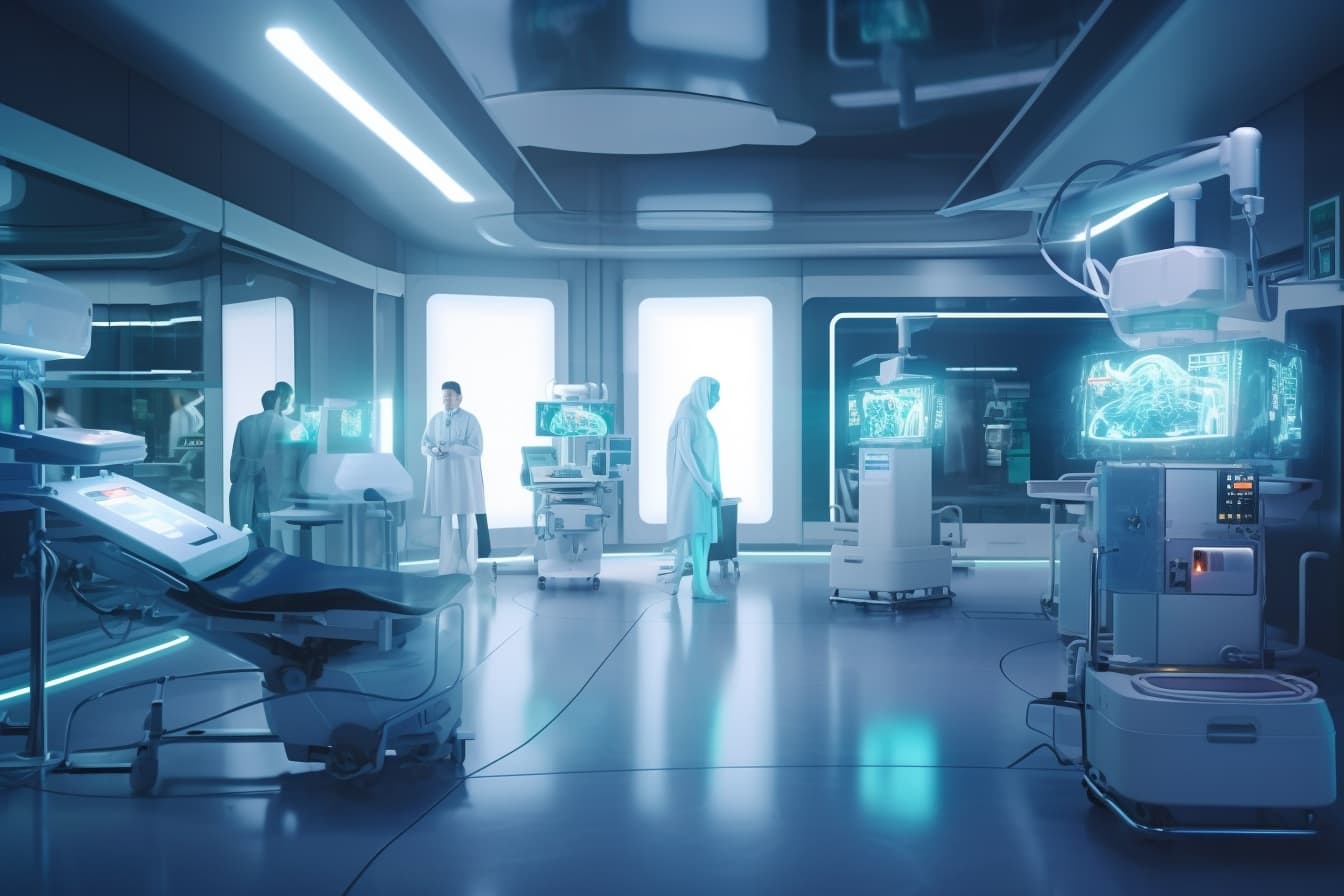The integration of artificial intelligence (AI) in healthcare systems has revolutionized the way medical professionals diagnose, treat, and manage patient care. The ability of AI to analyze vast amounts of data with speed and accuracy has transformed the healthcare industry into a new era of medical innovation.
AI is increasingly being utilized to improve traditional methods of diagnosis and treatment, as well as to streamline administrative tasks, ultimately leading to better outcomes for patients. Advancements in AI have led to personalized care plans that take into account a patient’s unique characteristics, including genetics, lifestyle factors, and medical history. This level of personalization allows for more targeted treatments that are tailored specifically to each individual’s needs.
Additionally, AI can assist physicians in making informed decisions by analyzing complex medical data quickly and accurately. As such, it is becoming increasingly common for healthcare providers to rely on AI-powered diagnostic tools for early detection and disease prevention.
The Integration of AI in Healthcare Systems
The integration of machine learning algorithms and predictive analytics into healthcare systems has demonstrated potential in enhancing clinical decision making and patient outcomes. Artificial intelligence (AI) is transforming healthcare by enabling healthcare practitioners to access, analyze, and interpret large volumes of data with greater speed and accuracy than ever before.
This allows for more accurate diagnosis, personalized treatment plans, improved disease management, and better overall patient care. The healthcare industry stands to benefit significantly from AI technology, as it can help reduce costs while improving the quality of care delivered to patients.
By automating routine tasks such as medical billing and coding, AI frees up valuable time for healthcare professionals to focus on providing compassionate and comprehensive care to their patients. As the use of AI in healthcare becomes more widespread, we can expect further innovation that will ultimately lead to better health outcomes for all.
Advancements in Diagnosis and Treatment with AI
Advancements in the field of diagnosis and treatment are poised to revolutionize the way healthcare professionals approach patient care, leading to improved outcomes and a more personalized approach to medicine.
Artificial intelligence (AI) has played a significant role in these advancements, particularly in the area of diagnostics. AI algorithms can analyze vast amounts of medical data from various sources, including electronic health records, imaging studies, and genetic testing results. This enables healthcare providers to make more accurate diagnoses faster than traditional methods.
Furthermore, AI is transforming healthcare by enabling physicians to develop personalized treatment plans for their patients based on their specific needs. With the help of AI-powered tools, doctors can identify patterns in patient data that may not have been apparent before. This allows them to tailor treatments to individual patients instead of relying on one-size-fits-all approaches.
Overall, as AI continues to evolve and mature within the healthcare sector, it has the potential to revolutionize patient care and improve health outcomes for millions of people around the world.
Personalized Care and Treatment Plans
Personalized care and treatment plans are becoming more prevalent in the healthcare industry, as they offer a tailored approach to patient needs that can lead to improved health outcomes, despite potential concerns about increased costs.
With the help of AI in healthcare times, personalized care has become easier to achieve. AI technology helps doctors create individualized treatment plans based on a patient’s unique medical history, lifestyle factors and genetics. By analyzing data from various sources and identifying patterns that may not be visible to the naked eye, AI algorithms can provide physicians with insights that help them make better decisions regarding patient care.
Moreover, personalized care times have also led to a shift in the healthcare system times towards preventative medicine. Rather than waiting for patients to get sick before taking action, doctors can use AI-powered tools for early detection and intervention. This approach allows physicians to identify potential issues before they become major health problems, reducing hospital stays and associated costs while improving patient outcomes.
Overall, ai in healthcare times is transforming how we approach patient care times by providing doctors with powerful tools that enable them to offer more personalized treatments while also focusing on preventative measures that keep patients healthy over the long term – an exciting new era of medical innovation time!
Streamlining Administrative Tasks with AI
Efforts are underway to optimize administrative tasks and minimize human error in the healthcare industry through the use of cutting-edge technology. AI tools are being implemented to streamline processes such as scheduling appointments, managing patient records, and billing. By automating these routine tasks, medical professionals can focus on providing better care for their patients.
The healthcare system times demand efficiency and accuracy, which can be achieved with AI’s help. With the ability to analyze vast amounts of data quickly and accurately, AI can assist with decision-making processes that were previously time-consuming or prone to human error.
For example, AI algorithms can predict patient outcomes based on past medical history and current symptoms, allowing doctors to develop more effective treatment plans. As a result, healthcare is delivered time-effectively while reducing costs associated with mistakes made by humans.
Future Possibilities and Impact of AI in Healthcare
The potential for technological integration in healthcare is vast, with many possibilities for improving processes and outcomes. Artificial intelligence (AI) is transforming healthcare by providing new ways to analyze data, diagnose diseases, and develop treatments. AI can process large amounts of information at a faster pace than humans, which can lead to earlier diagnosis and personalized treatment plans.
One way AI is impacting healthcare is through predictive analytics. By analyzing patient data such as medical history, genetics, lifestyle habits, and even social media behavior patterns, AI algorithms can predict the likelihood of certain diseases or health issues. This allows healthcare providers to intervene early on and prevent serious health problems from developing.
Another way AI is transforming healthcare is through precision medicine. By analyzing genetic data using machine learning algorithms, physicians can develop tailored treatment plans that are specific to each patient’s unique needs.
As AI continues to advance in the field of healthcare, its potential impact on improving patient outcomes will only continue to grow.
In conclusion, the future possibilities and impact of AI in healthcare are endless. From streamlining administrative tasks to developing personalized treatments based on individual patient data analysis, the potential benefits that AI could bring about in this industry are staggering.
While there may be concerns about privacy protection and ethical considerations when it comes to utilizing these technologies in healthcare settings, there’s no denying that artificial intelligence will play a significant role in shaping the future of medicine for years to come.
Conclusion
The integration of AI in healthcare has brought forth a new era of medical innovation. From advancements in diagnosis and treatment to personalized care plans, AI is revolutionizing the way healthcare systems operate. With the ability to analyze vast amounts of data quickly and accurately, AI has proven to be an invaluable tool for healthcare professionals.
One example of how AI is transforming healthcare is through its use in radiology. In a study conducted by Stanford University, a deep learning algorithm was able to diagnose pneumonia from chest X-rays with an accuracy rate that surpassed that of human radiologists. The implementation of this technology could potentially save countless lives by detecting early stages of the disease that may have been missed otherwise.
As we continue to explore the possibilities and impact of AI in healthcare, it’s important to remember that while technology can aid us in our efforts towards improving patient outcomes, it cannot replace the compassion and empathy required when dealing with human life. As Dr. Eric Topol puts it, ‘We need machines that can help us be more human.’
By combining the power of AI with the expertise and care provided by healthcare professionals, we can usher in a new age of innovative medical practices that prioritize both technological advancements and personal connections.








